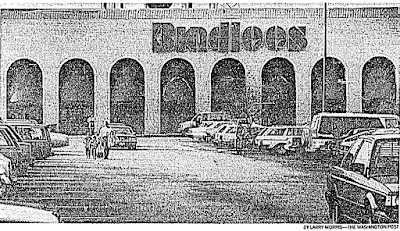Memco-Bradlees Buyout (1982-3)
Owned by Lucky Stores Inc. of Dublin, California, Memco was a members-only discount store – similar to Costco, Sam’s Club, or BJ’s – offering members a variety of both grocery items and general merchandise under one roof, making it among the earliest examples of a modern hypermarket. The brand was originally started as Gemco on the west coast, however as Lucky expanded the brand to the Midwest and Mid-Atlantic region, the name was changed to Memco in order to separate itself from G.E.M, an unrelated members-only retailer that also operated in the region. Memco first entered the Washington D.C. market in the mid-1970s with two stores: one in Annandale, and one in Camp Springs, both of which would operate until Memco’s metro-Washington division was sold off in the 80s[SOURCE]. The original stores were designed by McDonald-Engelhardt from Arlington, Virginia and featured a distinct arched façade and square physical footprint, which most of Memco’s subsequent Washington stores continued to use. The stores averaged around 90,000 square feet each.
The chain was able to achieve moderate success in the area, growing to 13 stores from Baltimore, Maryland to Richmond, Virginia, however by 1982 sales had slowed and Lucky was looking to spin off their mid-Atlantic Memco stores before they started to lose the company money.
By 1982, Bradlees had been able to expand its brand to 112 locations across the northeast and mid-Atlantic, with stores spanning from Maine to Virginia. Coming off its most profitable quarter to date and with upwards of $870 million in sales in the 1981 fiscal year, the Stop and Shop Company was eager to expand the Bradlees name, with their eyes set on Washington D.C. The previous few years had seen a number of retailers pull out of the region, such as Korvetes in 1980 and Woolco in 1982, and with 13 new stores with prime real estate coming onto the market, Bradlees jumped at the chance, striking a deal with Lucky to acquire Memco’s stores within weeks after the company’s decision to sell them.
The deal was made public on December 27, 1982, with Memco announcing that all 13 of their stores would be completely shut down within 14 days and the conversion to Bradlees would begin soon thereafter. In addition to the Memco stores already operating, Bradlees also acquired a site in Burke, Virginia where the foundation of a planned 14th D.C. Memco store had already been poured. Bradlees would finish the construction and open their store in Burke in November of 1983. At the time when Memco announced their store closings, their Greenebelt and Columbia locations had only been open for two months, having opened in October of 1982.
The short notice of the announcement drew criticism across the board as workers were only left with 14 days to find new jobs, and Bradlees had not committed to offering Memco employees positions or application priority in their new stores. The United Food and Commercial Workers Union was particularly vocal about their opposition, as provisions of the union contract required employers to give at least 30-days notice of store closings, which Memco failed to do. Others feared that the 1,000 former Woolco employees without jobs coupled with the nearly 2,000 former Memco employees now looking for work would make retail positions difficult to find, even with Bradlees estimating their new stores would open 1,700 new positions.
Despite the opposition, the properties were sold to Bradlees, and would be renovated and reopened by the summer of 1983. In order to more directly compete with Kmart, Bradlees removed the supermarket sections of Memco’s stores, and instead focused entirely on general merchandise, meaning fewer employees were required compared to Memco’s operations. Bradlees D.C.-division would be short lived, however, as Stop and Shop would eventually be forced to close their Washington locations in the late 1980s as part of an attempt to evade a hostile takeover attempt by Dart Group Corporation. Each of the former Memco-Bradlees locations either acquired new tenants after Bradlees’ closure or were demolished for the site to be redeveloped, however many of the stores that were not destroyed continue to bear Memco’s signature arched façade and square shape. The Home Depot and Kmart were among the biggest acquirers of the former Bradlees properties.
Properties included in the acquisition:
- Alexandria, VA (Presently Target, Original Store Demolished)
- Annandale, VA (Presently Home Depot)
- Camp Springs, MD (Presently From the Heart Church Ministries)
- Catonsville, MD (Presently Regency Furniture/Office Depot/PetSmart/St. Agnes)
- Columbia, MD (Presently Walmart)
- Dundalk, MD (Presently Giant/Big Lots)
- Fairfax, VA (Presently Home Depot)
- Fort Washington, MD (Presently Safeway)
- Greenbelt, MD (Became Kmart, Presently Vacant)
- Hyattsville, MD (Became Kmart, Presently Vacant)
- Reston, VA (Became Home Depot)
- Rockville, MD (Presently Ross/Trader Joe’s, Original Store Demolished)
- Richmond, VA (Exact Location Unknown)
- Burke, VA (Built as Bradlees, Became Kmart, Presently Walmart)








